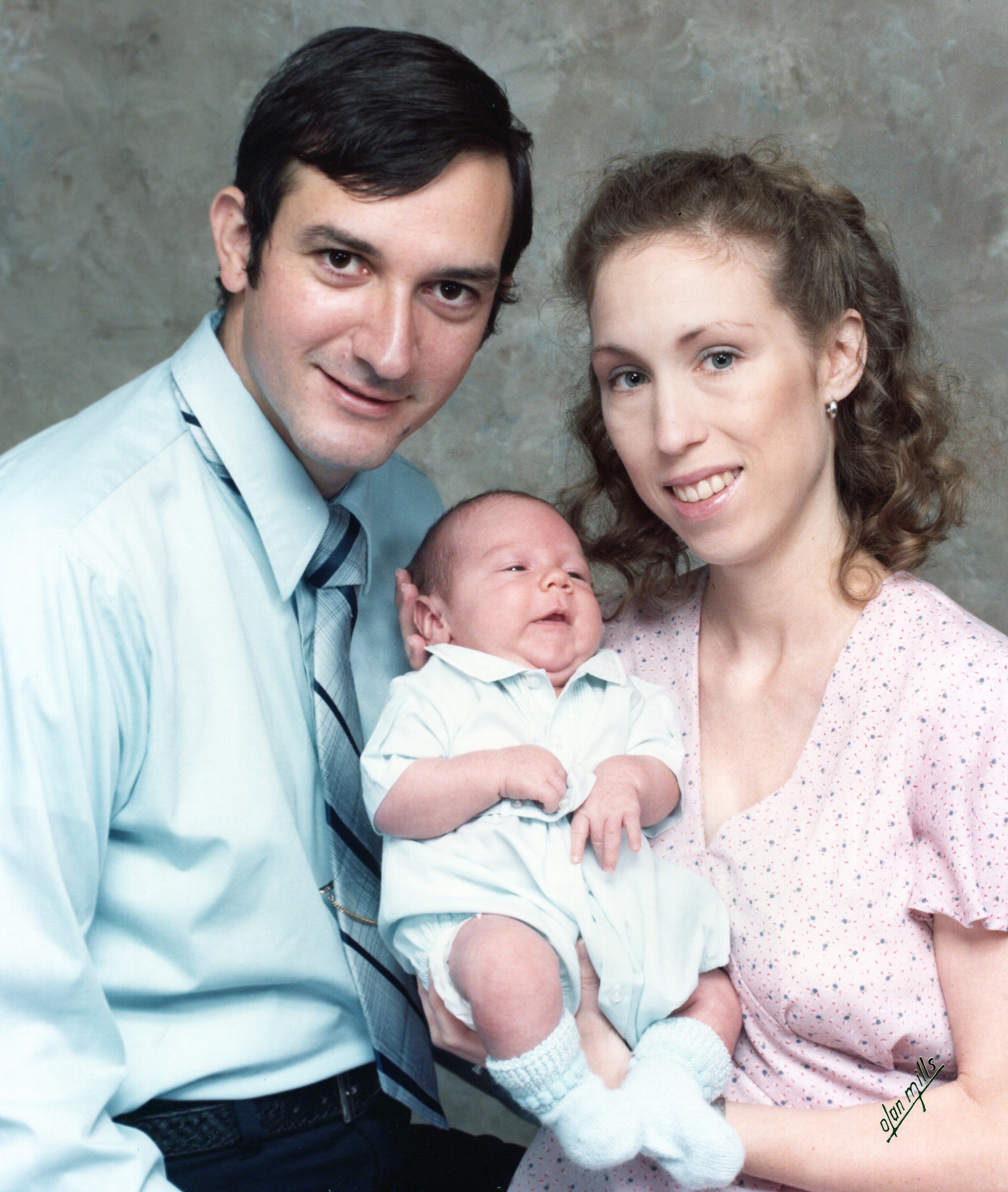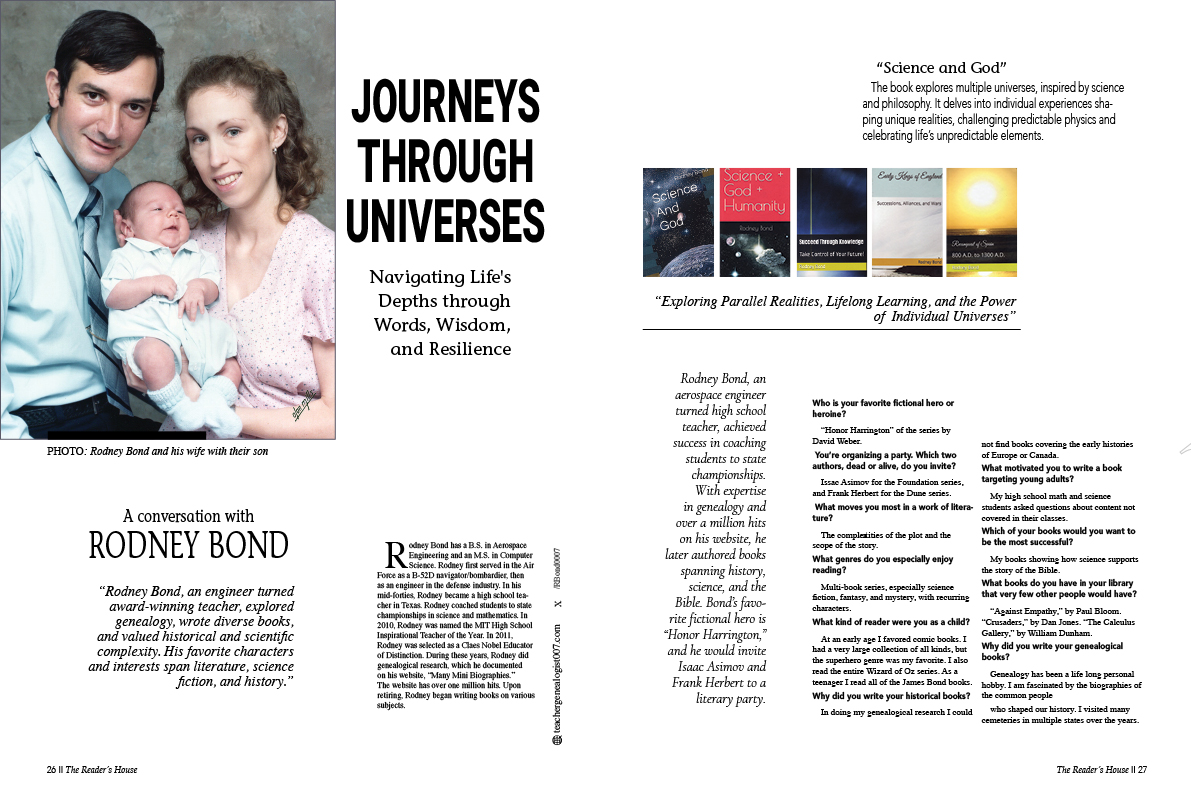Rodney Bond
Journeys Through Universes:
A Teacher's Quest from Aerospace to Education,
Genealogy to Writing
Exploring Parallel Realities,
Lifelong Learning,
and the Power of Individual Universes

PHOTO: Rodney Bond and his wife with their son.
Rodney Bond has a B.S. in Aerospace Engineering and an M.S. in Computer Science. Rodney first served in the Air Force as a B-52D navigator/bombardier, then as an engineer in the defense industry. In his mid-forties, Rodney became a high school teacher in Texas. Rodney coached students to state championships in science and mathematics. In 2010, Rodney was named the MIT High School Inspirational Teacher of the Year. In 2011, Rodney was selected as a Claes Nobel Educator of Distinction. During these years, Rodney did genealogical research, which he documented on his website, “Many Mini Biographies.” The website has over one million hits. Upon retiring, Rodney began writing books on various subjects.
Who is your favorite fictional hero or heroine?
“Honor Harrington” of the series by David Weber.
You’re organizing a party. Which two authors, dead or alive, do you invite?
Issac Asimov for the Foundation series, and Frank Herbert for the Dune series.
What moves you most in a work of literature?
The complexities of the plot and the scope of the story.
What genres do you especially enjoy reading?
Multi-book series, especially science fiction, fantasy, and mystery, with recurring characters.
What kind of reader were you as a child?
At an early age I favored comic books. I had a very large collection of all kinds, but the superhero genre was my favorite. I also read the entire Wizard of Oz series. As a teenager I read all of the James Bond books.
Why did you write your historical books?
In doing my genealogical research I could not find books covering the early histories of Europe or Canada.
What motivated you to write a book targeting young adults?
My high school math and science students asked questions about content not covered in their classes.
Which of your books would you want to be the most successful?
My books showing how science supports the story of the Bible.
What books do you have in your library that very few other people would have?
“Against Empathy,” by Paul Bloom. “Crusaders,” by Dan Jones. “The Calculus Gallery,” by William Dunham.
Why did you write your genealogical books?
Genealogy has been a life long personal hobby. I am fascinated by the biographies of the common people
who shaped our history. I visited many cemeteries in multiple states over the years.
Excerpt from the book “Science and God”
Chapter: “Multiple Universes + Humanity”
“There could be shadow galaxies, shadow stars, and even shadow people.” – Theoretical Physicist Stephen Hawking
In 1884, Edwin Abbot wrote the novel Flatland. This was an introduction to the concept of higher
dimensions of existence. In 1934, Murray Leinster wrote a short story, “Sidewise in Time.” This was one of the earliest multiple-universe stories in science fiction, describing geographically close areas with each in a different time. The British television series “Dr. Who” first aired in America in the 1960s, with a core theme of time travel. In 1970, an episode introduced the concept of a parallel universe.
In 1957, Hugh Everett III published an article in Nature magazine, an international weekly journal of science, which gave mathematical credibility to the multiple-universe concept. The multiple-universe concept is now prolific in science fiction books, television shows, and movies.
The concept of multiple universes is talked about in science and frequently outside of science. There is plenty of debate over the possibility that we are in just one of many parallel universes. That debate is centered on proving their existence. Philosophically, there is no debate. Every person’s existence creates a unique parallel universe!
The argument for parallel universes is simple. The first step is recognizing that on the day you were born you became the first person to be born in your lifetime. On the day you die, you will be the last person to die in your lifetime. What you do during that lifetime creates a new universe that would not have existed had you not been born.
Every person possesses items that are associated with some unique experience. It might be something collected on a trip, or an heirloom handed down from a family member, or a card or letter received from a friend. It might only be a photograph. The item, combined with its special memory, is unique to that individual. The combination of a specific item and its associated memory can never fully exist in any other person’s universe. Another person can know of the combination but cannot fully grasp the personal connection between the person and the item.
Older people have seen and experienced many things that people born long after them can never see or experience. Many watched the first moon landing on television in 1969. While younger people can watch a video of the event, they cannot experience the magnitude of the event. What older people experience through their senses and emotions cannot be passed to another person. Such events are unique to the individual’s universe and only exist while they are alive.
Each human’s lifelong journey creates a unique universe that intersects with some people and never intersects with others. Death deletes the person’s experiences, forever altering the totality of the known universe.
The universe described by physics is very boring. The motion of every inanimate object is explained by mathematics and the laws of physics. What will happen over time to inanimate objects due to physics is very predictable.
“Imagination is more important than knowledge.” - Albert Einstein
A fascinating counterexample is the mushroom. A person walking into their yard the morning after mowing might notice that a mushroom had grown overnight. Trillions of cells had organized themselves into a mushroom in a noticeably short time.
That is the power of life! Life is what makes the universe interesting. No existing laws of physics could have predicted that the mushroom would be there the next morning.
Now, someone might think, “That is because we just have not discovered enough physics to make that prediction,” and they might be right. But no law of physics, discovered or undiscovered, will ever explain free will, something the mushroom does not possess.
I chose to write this book. You chose to read this book. No laws of physics could have predicted those actions. A more in-depth discussion of “free will” is given later in the chapter “Heisenberg’s Uncertainty Principle + Humanity.”
Some components of anyone’s universe are created by others. Parents teach talking, counting, and naming colors to their young children. During formal education teachers of English, mathematics, and science introduced more advanced concepts. Through higher education, this universe-building process is partially standardized.
As an independent adult the individual starts selecting where his or her universe will expand. That expansion soon becomes a unique universe even though it shares commonalities with other people's universes.
Follow Rodney Bond





